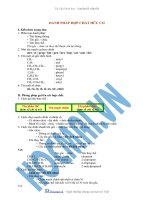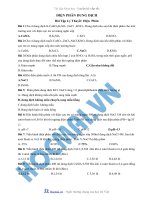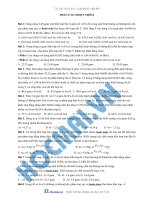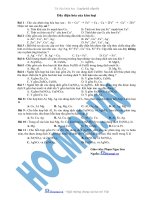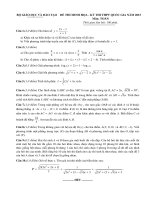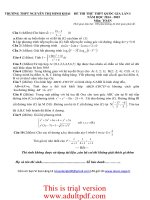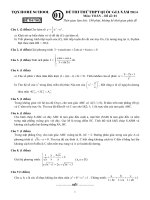Tải Đề luyện thi THPT Quốc gia môn tiếng Anh năm 2020 - Đề thi THPT Quốc gia môn Anh có đáp án
Bạn đang xem bản rút gọn của tài liệu. Xem và tải ngay bản đầy đủ của tài liệu tại đây (144.09 KB, 10 trang )
<span class='text_page_counter'>(1)</span><div class='page_container' data-page=1>
<b>ĐỀ LUYỆN THI THPTQG MÔN TIẾNG ANH</b>
<b>NĂM 2020 CÓ ĐÁP ÁN</b>
<i><b>Mark the letter A, B, C, or D on your answer sheet to indicate the word that differs from the other </b></i>
<i><b>three in the position of primary stress in each of the following questions.</b></i>
<b>Question 1. A. teacher</b> <b>B. lesson</b> <b>C. action</b> <b>D. police</b>
<b>Question 2. A. importance</b> <b>B. happiness</b> <b>C. employment</b> <b>D. relation</b>
<i><b>Mark the letter A, B, C, or D on your answer sheet to indicate the word whose underlined part </b></i>
<i><b>differs from the other three in pronunciation in each of the following questions.</b></i>
<b>Question 3. A. da te</b> <b>B. face</b> <b>C. page</b> <b>D. ma p</b>
<b>Question 4. A. played </b> <b>B. planned</b> <b>C. cooked</b> <b>D. lived</b>
<i><b>Mark the letter A, B, C, or D on your answer sheet to indicate the correct answer to each of the </b></i>
<i><b>following questions.</b></i>
<b>Question 5: Like most marine mammals and land mammals, whales are _______ creatures</b>
<b>A. blood-warmed B. warm-blood C. warm-blooded D. warm-blooding</b>
<b>Question 6: Fax transmission has now become a cheap _____ way to transmit texts and graphics over</b>
distance.
<b>A. convenientB. inconvenient C. uncomfortable D. comfortable </b>
<b>Question 7: She agreed that all the present paperwork _____ for everyone to have more time to</b>
socialize.
<b>A. stopping</b> <b>B. be stopped</b> <b>C. to stop</b> <b>D. stopped</b>
<b>Question 8: In today's paper, it _______ that there will be a new government soon.</b>
<b>A. writes</b> <b>B. tells</b> <b>C. states</b> <b>D. records</b>
<b>Question 9: The local press has been pouring _______ on the mayor for dissolving the council.</b>
<b>A. scorn</b> <b>B. blame</b> <b>C. disapproval</b> <b>D. hatred</b>
</div>
<span class='text_page_counter'>(2)</span><div class='page_container' data-page=2>
<b>A. reduce</b> <b>B. produce</b> <b>C. increase</b> <b>D. preserve</b>
<b>Question 11: A curriculum that ignores ethnic tensions, racial antagonisms, cultural _____ and </b>
<b>religious differences is not relevant.</b>
<b>A. contacts</b> <b>B. barriers</b> <b>C. diversity</b> <b>D. levels</b>
<b>Question 12: The speaker fails to get his message _______to his audience.</b>
<b>A. around</b> <b>B. in</b> <b>C. across</b> <b>D. out</b>
<b>Question 13: You are under no obligation ______ to accept this offer.</b>
<b>A. whatsoever</b> <b>B. eventually</b> <b>C. apart</b> <b>D. indeed</b>
<b>Question 14: There's a lot more to Willie than one would think: still waters run _______.</b>
<b>A. deep</b> <b>B. deeply</b> <b>C. deepness</b> <b>D. depth</b>
<b>Question 15: Many people and organizations have been making every possible effort in order to </b>
save _______ species.
<b>A. endangered</b> <b>B. dangerous</b> <b>C. fearful D. threatening</b>
<b>Question 16: Air pollution is getting _______ serious in big cities in the world.</b>
<b>A. more and more</b> <b>B. the more and the more</b>
<b>C. the most and the most</b> <b>D. most and most</b>
<i><b>Mark the letter A, B, C, or D on your answer sheet to indicate the word(s) CLOSEST in </b></i>
<i><b>meaning to the underlined word (s) in each of the following questions.</b></i>
<b>Question 17: The factory is fined for discharging dangerous chemicals into the river.</b>
<b>A. releasing</b> <b>B. increasing</b> <b>C. decreasing</b> <b>D. keeping</b>
<b>Question 18: A series of programs have been broadcast to raise public awareness of healthy living.</b>
<b>A. experience</b> <b>B. understanding</b> <b>C. confidence</b> <b>D. assistance</b>
<i><b>Mark the letter A, B, C, or D on your answer sheet to indicate the word(s) OPPOSITE in </b></i>
<i><b>meaning to the underlined word(s) in each of the following questions.</b></i>
</div>
<span class='text_page_counter'>(3)</span><div class='page_container' data-page=3>
<b>A. slow</b> <b>B. rapid C. careful D.hurried </b>
<b>Question 20: Our well-trained staff are always courteous to customers.</b>
<b>A. helpful</b> <b>B. friendly</b> <b>C. help</b> <b>D. polite</b>
<i><b>Mark the letter A, B, C, or D on your answer sheet to indicate the sentence that best completes </b></i>
<i><b>each of the following exchanges.</b></i>
<b>Question 21: -The shop assistant: “This is my last portable CD player. I'll let you have it for fifty </b>
dollars”.
- Stevenson: “ ?”.
<b>A. Could you give me your last CD? B. Can you tell me your favourite type of music?</b>
<b>C. Could you give me a discount? D. Could you possibly give me fifty dollars?</b>
<b>Question 22: -Customer: "Can I try this jumper on?".</b>
-Salesgirl: “ ?”.
<b>A. Yes, it costs one hundred and fifty dollars. B. No, the shop is closed in half an hour.</b>
<b>C. Sorry, only cash is accepted here. D. Sure, the changing rooms are over there. </b>
<i><b>Read the following passage and mark the letter A, B, C, or D on your answer sheet to indicate the </b></i>
<i><b>correct word or phrase that best fits each of the numbered blanks from 23 to 27.</b></i>
<b>Nowadays people are more aware that wildlife all over the world is in (23) . </b>
<b>Many species of animals are threatened, and could easily become (24) if we do not make</b>
an effort to protect them. In some cases, animals are hunted for their fur or for other valuable
<b>parts of their bodies. Some birds, such as parrots, are caught (25) and sold as pets. For</b>
many animals and birds the problem is that their habitat - the place where they live - is
disappearing. More land is used for farms, for houses or industry, and there are fewer open
spaces than there once were. Farmers use powerful chemicals to help them to grow better
<b>crops, but these chemicals pollute the environment and (26) wildlife. The most successful animals</b>
<b>on earth - human beings - will soon be the only ones (27) unless we can solve this problem.</b>
<i>(Source: />
<b>Question 23: A. threat</b> <b>B. problem</b> <b>C. danger</b> <b>D. </b>
</div>
<span class='text_page_counter'>(4)</span><div class='page_container' data-page=4>
<b>Question 25: A. life</b> <b>B. alive</b> <b>C. lively</b> <b>D. live</b>
<b>Question 26: A. spoil</b> <b>B. wound</b> <b>C. wrong</b> <b>D. harm</b>
<b>Question 27: A. left</b> <b>B. alone</b> <b>C. staying</b> <b>D. survive</b>
<i><b>Read the following passage and mark the letter A, B, C, or D on your answer sheet to indicate the</b></i>
<i><b>correct answer to each of the questions from 28 to 35.</b></i>
The blue whale is the largest animal ever known to have existed. During the 20th century,
the species was almost exterminated due to commercial whaling. The species has slowly
recovered following the global whaling ban but it remains endangered and faces a number of
serious threats including ship strikes and the impact of climate change.
Blue whales are simply enormous with most ranging in length from 24-30 m. The largest
ever recorded was a gargantuan 33.5 m long. Females are up to 10 m longer than males. And they
can weigh up to 200 tonnes. Just to put that in perspective: an adult male African elephant weighs
6 tonnes. The blue whale's heart is the size of a small car and its beat can be detected two miles
away. But that's nothing compared to their calls. Blue whales are the loudest animals on earth and
their calls are louder than a jet engine: reaching 188 decibels, while a jet's engine hit 'just' 140
decibels. Apart from their gigantic size, blue whales can be identified by their relatively small
dorsal fin, a fairly rounded rostrum (anterior part of the skull), and approximately 90 ventral grooves,
which reach the navel. They also have row of 300-400 baleen plates on each side of the mouth,
which are black in color and range in length from 50 cm in front to 100 cm in back.
Blue whales mostly travel alone or in groups of 2-3. Larger groups of up to 60 whales have
been reported and are probably associated with feeding grounds. However, the blue whale has the
most powerful voice in the animal kingdom and its low-frequency sounds can travel in deep water
over hundreds, or even thousands, of miles. Under these circumstances, animals which may appear to
us to be traveling alone may actually be in constant contact with one another.
</div>
<span class='text_page_counter'>(5)</span><div class='page_container' data-page=5>
Like other large whales, blue whales are threatened by chemical and sound pollution, habitat
<b>loss, overfishing of krill, ship strikes and becoming entangled in fishing gear. Climate change could</b>
also have a major impact on its food supply, since global warming and associated ocean acidification
may impact krill populations. In addition, frontal zones - critical whale habitats - are projected to
move further south due to climate change. Frontal zones are boundaries between different water
masses, where water can rise from the depths, bringing with it large amounts of nutrients that
stimulate the growth of phytoplankton and support substantial populations of prey species for whales.
Blue whales would have to migrate further (perhaps 200-500 km more) to reach and feed at these
food-rich areas where they build up reserves to sustain themselves for the rest of the year. These
longer migration paths could increase the energy costs of migration and reduce the duration of the
main feeding season. As frontal zones move southward, they also move closer together, reducing the
overall area of foraging habitat available.
(Source: l <i>)</i>
<b>Question 28: What is the purpose of the author in the passage?</b>
<b>A. To provide basic information about the blue whale and its major threats.</b>
<b>B. To prove that the blue whale is the biggest mammal on the Earth.</b>
<b>C. To give evidence of how the blue whale changes the habit and feeding grounds.</b>
<b>D. To raise people's awareness of the extinction of the blue whale,</b>
<b>Question 29: Which of the following is NOT correct about the blue whale's physical description?</b>
<b>A. It is very easy to discover the appearance of a blue whale via its heart beat</b>
<b>B. Male blue whales are the longest in their species.</b>
<b>C. The calls of the blue whale are louder than those of any animals on the Earth.</b>
<b>D. A small dorsal fin is also the identity of the blue whale.</b>
<b>Question 30: According to the passage, why isn't a blue whale lonely when it travels alone?</b>
<b>A. Because most of other blue whales also travel alone.</b>
<b>B. Because it can contact with others through their powerful voice.</b>
<b>C. Because it shares the same feeding grounds with others.</b>
<b>D. Because other blue whales will appear when it reaches the destination.</b>
</div>
<span class='text_page_counter'>(6)</span><div class='page_container' data-page=6>
<b>A. stop feeding a calf with its mother's milk</b> <b>B. stop growing as fast as before</b>
<b>C. begin living independently</b> <b>D. begin trying to find food</b>
<b>Question 32: The word "entangled" in paragraph 5 is closest in meaning to ______.</b>
<b>A. endangered</b> <b>B. disappeared</b> <b>C. ensnared</b> <b>D. attracted</b>
<b>Question 33: What does the word "it" in the last paragraph refer to?</b>
<b>A. the depth</b> <b>B. water C. water mass D. climate change</b>
<b>Question 34: According to the last paragraph, how does climate change affect the blue whale?</b>
<b>A. It increases the acidity in the ocean, which makes the water polluted.</b>
<b>B. It impacts on the tide which contains a lot of nutrients to feed the blue whale's prey.</b>
<b>C. It makes the blue whale travel farther south to find feeding grounds.</b>
<b>D. It encourages frontal zones so that the blue whale cannot move around.</b>
<b>Question 35: It can be inferred from the passage that ______.</b>
<b>A. Human activities are one of the primary reasons for the decline of the blue whale's </b>
population.
<b>B. The blue whale is the animal that has the longest life expectancy.</b>
<b>C. Despite being the largest animals, blue whales are the most vulnerable on the Earth.</b>
<b>D. The blue whale lives safely in the ocean thanks to their solidarity.</b>
<i><b>Read the following passage and mark the letter A, B, C, or D on your answer sheet to indicate the </b></i>
<i><b>correct answer to each of the questions from 36 to 42.</b></i>
Scientists have uncovered a new threat to the world's endangered coral reefs. They have found
<b>that most are incapable of growing quickly enough to compensate for rising sea levels triggered by</b>
global warming. The study suggests that reefs - which are already suffering serious degradation
because the world's seas are warming and becoming more acidic - could also become overwhelmed
by rising oceans.
</div>
<span class='text_page_counter'>(7)</span><div class='page_container' data-page=7>
reefs across the Caribbean and Indian Ocean regions, where the study focused, rates of growth are
slowing due to coral reef degradation," said Professor Chris Perry, of Exeter University.
“Meanwhile, rates of sea-level rise are increasing - and our results suggest reefs will be unable to
keep up. As a result, water depths above most reefs will increase rapidly through this century.”
Sea levels rose by several inches over the past century and measurements indicate the speed
of this increase is now rising significantly. Two key factors are involved: climate change is making
ocean water warmer and so it expands. And as ice sheets and glaciers melt, they increase amounts
of water in the oceans.
At the same time, reefs are being weakened by ocean warming and also by ocean
<b>acidification, triggered as the seas absorb more and more carbon dioxide. These effects lead to</b>
bleaching events that kill off vast stretches of coral and limits their ability to grow.
<b>“Our predictions, even under the best case scenarios, suggest that by 2100, the inundation</b>
of reefs will expose coastal communities to significant threats of shoreline change,” said co-author
Prof Peter Mumby of Queensland University. This point was backed by US marine scientist Ilsa
<i>Ruffner writing in a separate comment piece for Nature. “The implications of the study are dire.</i>
Many island nations and territories are set to quickly lose crucial natural resources.”
<i>(Source: guardiamcomi)</i>
<b>Question 36: Which of the following does the passage mainly discuss?</b>
<b>A. Sea levels will become the main factor of bleaching.</b>
<b>B. Coral reefs will be overwhelmed by rising oceans.</b>
<b>C. Coral reefs may escape from extinction because of the increase in sea levels.</b>
<b>D. Global warming will cause the rise of sea levels.</b>
<b>Question 37: What does the word "compensate" in the first paragraph probably mean?</b>
<b>A. recompense B. keep up with C. develop D.benefit </b>
<b>Question 38: What did scientists at Exeter University find in their research?</b>
<b>A. Tropical coral reefs are increasing more quickly than others in Pacific Ocean.</b>
<b>B. The majority of tropical coral reefs cannot keep pace with the increasing rate of sea </b>
levels.
<b>C. Many coral reefs are developing in spite of their degradation.</b>
</div>
<span class='text_page_counter'>(8)</span><div class='page_container' data-page=8>
<b>Question 39: According to the passage, the two factors causing the rise of sea levels are ______.</b>
<b>A. global warming and freeze B. severe weather and climate change</b>
<b>C. climate change and ice expansion</b> <b>D. climate change and ice melt</b>
<b>Question 40: What does the phrase "these effects" in paragraph 4 refer to?</b>
<b>A. ocean warming and ocean acidification</b> <b>B. reef weakening and ocean warming</b>
<b>C. reef weakening and ocean acidification</b> <b>D. ocean warming and CO2 absorb</b>
<b>Question 41: The word "inundation" is closest in meaning to _______.</b>
<b>A. drought</b> <b>B. extinction</b> <b>C. flood</b> <b>D. tsunami</b>
<b>Question 42: The author implies in the last paragraph that _______.</b>
<b>A. even in the most optimistic prediction, coral reefs will experience their extinction.</b>
<b>B. the results of the study are more serious than what scientists have predicted.</b>
<b>C. human activities will not only affect marine life but also put themselves at risk.</b>
<b>D. people often exploit natural resources in island nations and territories.</b>
<i><b>Mark the letter A, B, C, or D on your answer sheet to indicate the underlined part that needs </b></i>
<i><b>correction in each of the following questions.</b></i>
<b>Question 43: Many people who live near the ocean depend </b> on it as a source of food , recreation,
and to have economic opportunities.
<b>A. depend on B. food</b> <b>C. recreation</b> <b>D. to have economic Question 44: The </b>
number of wild horses on Assateague is increasing, resulted in overgrazed marsh and dune
grasses.
<b>A. number</b> <b>B. is</b> <b>C. resulted</b> <b>D. grasses</b>
<b>Question 45: Many people object to </b> use physical punishment in dealing with discipline
problems at school.
A. to use <b>B. punishment</b> <b>C. dealing with</b> <b>D. at school</b>
<i><b>Mark the letter A, B, C, or D on your answer sheet to indicate the sentence that is closest in </b></i>
<i><b>meaning to each of the following questions.</b></i>
</div>
<span class='text_page_counter'>(9)</span><div class='page_container' data-page=9>
<b>B. It is said that no fewer than ten people are going to be interviewed for the job.</b>
<b>C. People say that fewer than ten job interviews have been held so far.</b>
<b>D. I have heard that only ten people have been chosen to have the job interviewed.</b>
<b>Question 47: Eating with chopsticks feels strange to Jonathan.</b>
<b>A. Eating with chopsticks isn't what Jonathan used to.</b>
<b>B. Jonathan is not used to eating with chopsticks.</b>
<b>C. Not feeling strange, Jonathan tries eating with chopsticks.</b>
<b>D. Jonathan didn't use to eat with chopsticks.</b>
<b>Question 48: "Why don't you have your room repainted?" said Robert to Lan.</b>
<b>A. Robert suggested having Lam's room repainted.</b>
<b>B. Robert asked Lam why you didn't have your room repainted.</b>
<b>C. Robert wanted to know why Lam doesn't have his room repainted,</b>
<b>D. Robert suggested that Lam should have his room repainted.</b>
<i><b>Mark the letter A, B, C, or D on your answer sheet to indicate the sentence that best combines </b></i>
<i><b>each of sentences in the following questions.</b></i>
<b>Question 49: She received the exam results. She immediately phoned her morn.</b>
<b>A. She immediately phoned her mom that she would receive the exam results.</b>
<b>B. No sooner had she received the exam results than she phoned her mom.</b>
<b>C. No sooner had she phoned her mom than she received the exam results.</b>
<b>D. She received the exam results immediately after she phoned her mom.</b>
<b>Question 50: She helped us a lot with our project. We couldn't continue without her.</b>
A. Unless we had her contribution, we could continue with the project.
B. But for her contribution, we could have continued with the project.
C. If she hadn't contributed positively, we couldn't have continued with the project.
D. Provided her contribution wouldn't come, we couldn't continue with the project
<b>ĐÁP ÁN</b>
1 - D 2 - B 3 - D 4 - C 5 - C 6 - A 7 - B 8 - C 9 - A 10 - D
</div>
<span class='text_page_counter'>(10)</span><div class='page_container' data-page=10>
31 - A 32 - C 33 - B 34 - C 35 - A 36 - B 37 - A 38 - B 39 - D 40 - A
41 - C 42 - C 43 - D 44 - C 45 - A 46 - B 47 - B 48 - D 49 - B 50 - C
</div>
<!--links-->
<a href='l/'> </a>
